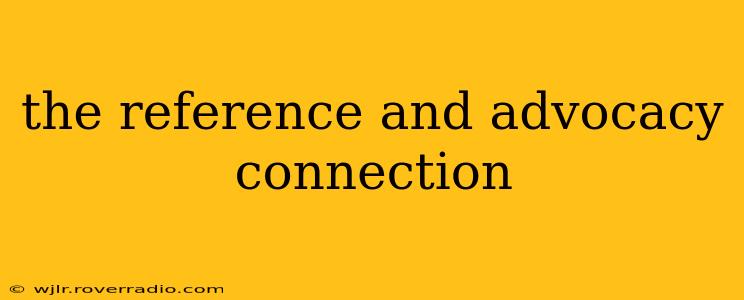The Reference and Advocacy Connection: Building Powerful Networks for Career Success
The world of career advancement is increasingly reliant on networks and relationships. While resumes and skills are crucial, securing your dream job or promotion often hinges on who knows you and what they say about you. This is where the powerful connection between references and advocacy comes into play. This article will explore this crucial link, helping you understand how to leverage both for maximum career impact.
What is a Reference?
A reference is a person who can vouch for your skills, experience, and character. They're typically former supervisors, colleagues, professors, or mentors who can provide objective insights into your work ethic, capabilities, and suitability for a specific role. A strong reference provides concrete examples to support their claims, illustrating your contributions and achievements.
What is Advocacy?
Advocacy goes beyond simply providing a reference. It's an active process of promoting and supporting someone's career. An advocate actively champions your skills and potential, going beyond a simple recommendation to actively connecting you with opportunities, providing career guidance, and even speaking up on your behalf during interviews or promotion considerations.
How are References and Advocacy Connected?
The connection is straightforward: strong references often lead to advocacy. When someone consistently provides positive and detailed references for you, they are more likely to become an active advocate. Their positive experiences with your work translate into a willingness to actively promote your career growth. This isn't always automatic, however. You need to cultivate these relationships to encourage this transition.
How Do I Cultivate Strong References and Advocates?
1. Build Meaningful Relationships: Don't just collect names; build genuine connections. Engage actively with your colleagues, supervisors, and mentors. Seek their feedback, learn from their expertise, and show genuine appreciation for their guidance.
2. Go Beyond the Job Description: Make a conscious effort to demonstrate your value beyond the tasks outlined in your job description. Take initiative, volunteer for challenging projects, and actively seek opportunities to develop your skills and contribute to the team's success.
3. Document Your Achievements: Keep a record of your accomplishments, projects, and contributions. This will help you articulate your value to potential references and advocates, providing them with specific examples to draw upon.
4. Ask for Feedback Regularly: Request regular feedback from your supervisors and colleagues. This demonstrates your commitment to improvement and provides opportunities to address any concerns before they escalate. It also gives you a chance to understand what aspects of your work are most valued.
5. Maintain Contact After Leaving a Role: Keep in touch with former colleagues, supervisors, and mentors. Networking doesn't end when you leave a job. Continued communication strengthens relationships and ensures they remember your contributions and capabilities.
What Makes a Strong Reference?
- Specificity: A strong reference avoids vague generalities and provides specific examples illustrating your skills and accomplishments.
- Credibility: The reference should be from a credible source—someone with authority and a clear understanding of your abilities.
- Relevance: The reference should be relevant to the job or opportunity you are pursuing.
- Enthusiasm: A genuine enthusiasm for your capabilities and potential is highly valuable.
How Can I Turn a Reference into an Advocate?
- Ask for Mentorship: Explicitly ask for mentorship and career guidance. This signals your desire for a deeper, more supportive relationship.
- Stay in Touch: Regular communication builds trust and strengthens the relationship. Share your career goals and seek their advice.
- Show Appreciation: Express your gratitude for their support and guidance.
- Reciprocity: Offer your support and assistance when possible. Building reciprocal relationships fosters stronger bonds.
What if I Don't Have Strong References or Advocates?
Don't despair! It's never too late to start building these crucial relationships. Focus on networking, actively seeking opportunities to demonstrate your skills, and building meaningful connections with colleagues, mentors, and professionals in your field. Volunteer work, professional organizations, and industry events are excellent places to expand your network.
By understanding and actively cultivating the connection between references and advocacy, you can significantly enhance your career prospects and achieve your professional aspirations. It's not just about who you know; it's about who knows you—and champions your success.
